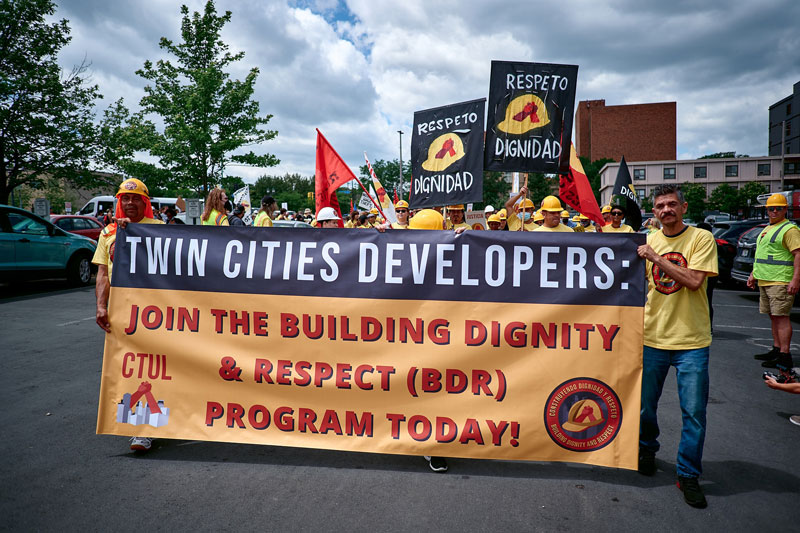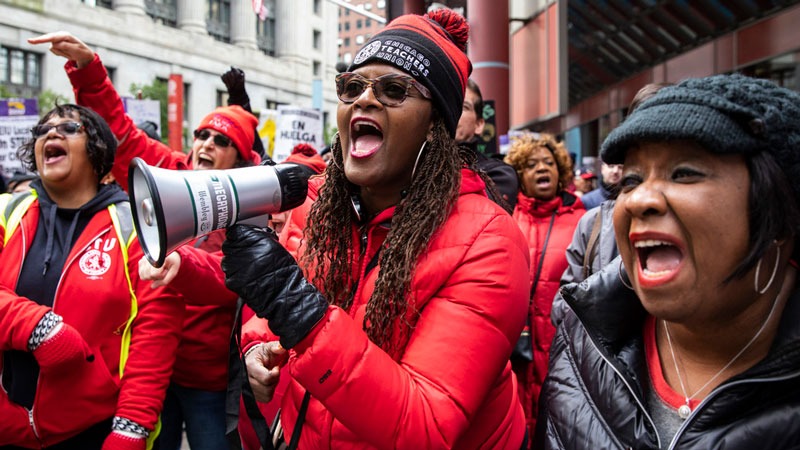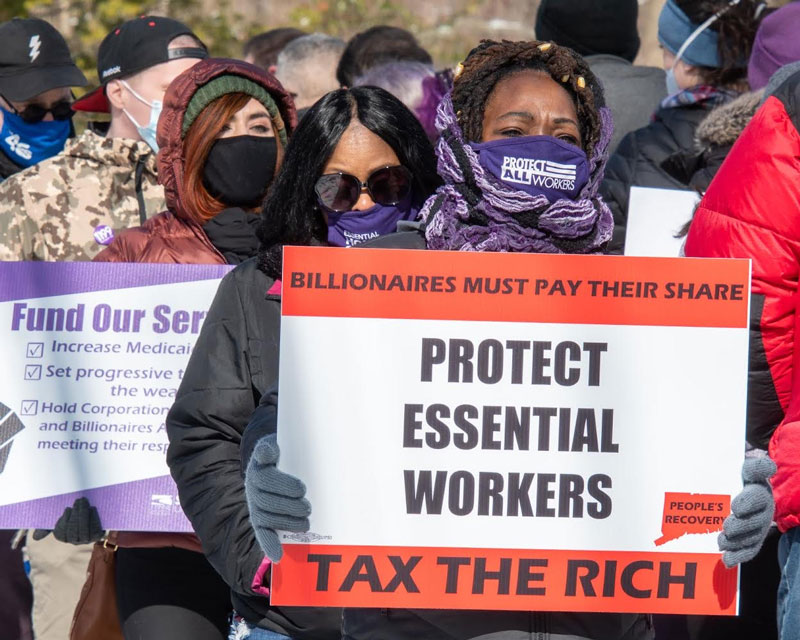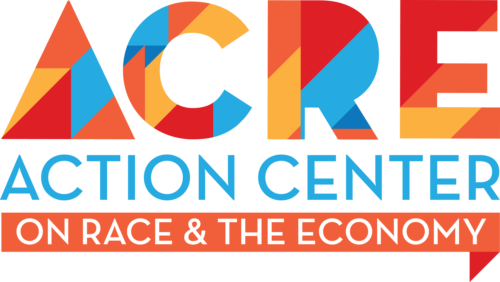This article is the fourth installment in our series co-produced by Bargaining for the Common Good and NPQ, titled Building a Movement for the Common Good. In this series, we learn how and why Bargaining for the Common Good (BCG) is the right strategy for our times of social crisis, featuring extreme wealth inequality and declining democracy as well as a renewed attention to labor organizing and mass uprisings for racial justice. The authors reflect on how the BCG strategy needs an intersectional, critical race feminist approach in order to advance racial and economic movement that can take on 21st century capitalism
Our democracy is in shambles. The racist and radical right wing, institutionalized in the GOP, won the right to impanel a retrograde Supreme Court—one committed to rolling the clock back to an America where Black Americans are back on plantations, LGBTQIA+ individuals are back in the shadows, women are barefoot and pregnant, and landholding, gun-toting white men are the only individuals with freedom. Over the span of the last several years, the Supreme Court affirmed the revocation of worker rights, civil rights, voting rights, and reproductive rights. Opposition to the GOP’s exclusionary practices requires an equally radical reimagining of coalition work. One of many ways unions and community organizations are building power together is through innovative strategies such as Bargaining for the Common Good (BCG).
When unions focus on bargaining in a way that addresses the whole person and members’ whole communities, they can transform both the union itself and our communities. BCG encourages common good campaigns, meaning campaigns grounded in a critical analysis of the interlocking oppressions, including racism and sexism, that shape community conditions and suppress worker power and economic justice. It advances multi-pronged approaches that are necessary to structurally change those conditions and calls on labor to demand respect for the humanity of its members and neighbors through common good unionism.
Telling Counterstories: Intersectionality and the Labor Movement
Bargaining for the Common Good is an intersectional feminist strategy. In a 2020 piece for The Forge, “We Want Bread and Housing Too,” Lauren Jacobs, Executive Director of PowerSwitch Action, Renata Pumerol of the Action Center on Race and the Economy (ACRE), and Sheri Davis and Marilyn Sneiderman of Rutgers’ Center for Innovation in Worker Organization (CIWO) asserted that intersectionality is key to building strong social movements because it “is the analysis that made clear the interconnectedness of different unjust and exploitative systems.… Having an intersectional approach means everyday folks have a forum and a means to build real solidarity and more tools to win bigger gains.”
The concept of intersectionality emerges from a labor struggle: Black women at a car manufacturing company lacked support from their union or legal redress for identity-specific layoffs that were informed by racist and sexist policies and practices. “The labor movement was not a movement focused on the ability of men to financially support the patriarchally headed family,” the authors write, “it was a movement by which workers would fight for the nurturing and security of an entire community.” However, while widely referenced in Black feminist and critical race theory, intersectionality has only recently been included in labor literature. It is nonetheless central to a critical race and feminist approach that promotes:
- Counterstories that center the experiences of marginalized, invisibilized, silenced communities of color and illuminate how these communities are legally and economically excluded from basic rights, resources, and privileges as a result of racism, sexism, and other forms of oppression
- Contextualizing counterstories within historical events, legislation, and contemporary policies and cultural practices, revealing how white supremacy is a system rooted in the exploitation of Black labor and displacement of Indigenous peoples from the land, with the ultimate characteristic of this system being the “right to exclude”
- Naming the practice of barring certain groups from participating in the development of legal and cultural remedies to society’s ills precisely because multiple systems of oppression are working together to exploit these same groups and create unique barriers
- Caution and reflection regarding “progress” that occurs when elites’ interests converge with the demands of marginalized communities because the tendency has been for elites to co-opt movement messaging for profit while maintaining oppressive structures
- “Looking to the bottom” of the social hierarchy to learn about historical harms and ways to remedy them through reparatory justice projects that seek to restructure oppressive systems
When Bargaining for the Common Good is done well it models an alternative way to theorize the root causes of oppression, to take action with impacted communities to remedy the problem, and to reflect on what liberation looks like for historically marginalized and exploited peoples.
Community and worker justice organizations are putting critical race feminism into practice by making broader demands and building power to win bigger victories for gender, racial, and economic justice. The themes and stories across campaigns reveal how women are leading these organizations with more collaborative styles of leadership. In this newer and more successful praxis, campaign demands reflect issues raised by women POC membership, and democratic processes for decision-making lead to long-term relationships that advance radical solidarity.
Tending the Soil: From Contract Campaigns to Radical Solidarity

In June of this year, a coalition of Minnesota organizations called Tending the Soil (TTS) hosted a week of action that demonstrated the power of BIPOC-led worker and community power. Actions addressed climate concerns and the role of utility companies, declining labor standards, unfit housing, and unjust working conditions at Amazon.
Tending the Soil is a coalition of Minnesota organizations led by people of color and formed with the purpose of organizing in working-class communities of color with a shared analysis of power and organizing strategy. The TTS organizational alliance is currently comprised of: the Awood Center; the Centro de Trabajadores Unidos en la Lucha (CTUL); Inquilinxs Unidos por Justicia (IX)/Renters United for Justice; the New Justice Project; SEIU Local 26; and Unidos MN EF/Navigate. TTS launched as a formal organization in 2021; however, the organizational alliance has existed since 2018 with an origin story dating back to 2008. These groups work together to identify intersectional approaches to their campaigns to build real, lasting solidarity.
Workers from TTS organizations—including CTUL non-union construction worker-members and Local 26 union members—have been working together to establish a Labor Standards Board in the City of Minneapolis. Made up of workers, employers, and the public, this policy board would be empowered to investigate market-specific conditions and inequalities in the city. In addition, the board could make recommendations for safety regulations, minimum wages, training, and scheduling requirements, among other areas of oversight.
During the week of action, TTS organizations and their allies marched through downtown Minneapolis to call on Twin Cities Developers to support the establishment of such a board. The organizations have placed a high value on ensuring that BIPOC and women leaders from impacted communities lead the movement, on forming a shared analysis of power that recognizes the intersectionality of unjust and exploitative systems, and on building community solidarity as the central component to common good work.
In February 2020, thousands of SEIU Local 26 janitors struck in Minnesota’s Twin Cities for better working conditions and to address environmental concerns. Their demands included the creation of a committee consisting of building owners, contractors/employers, and union members to address commercial building carbon emissions, the right to review cleaning products and promote the use of green chemicals, and a Green Cleaning Fund program.
SEIU Local 26 invited community-based environmental justice organizations, including Environment Minnesota, MN Youth Climate Strikers, Sierra Club, MN 350, and MN BIPOC Climate & Environmental Justice Table, to open bargaining sessions during which participants engaged in vigorous debates over green cleaning demands and the 2020 strike vote. Together, these organizations produced the report, Sky High Pollution, highlighting the immediate environmental issues workers and community members were (and still are) grappling with and which formed the foundation of worker and community demands. Union member and climate refugee Elsa Guamán explained how she was displaced from her childhood home in Ecuador due to climate devastation. She did not hesitate to join her union’s campaign for climate justice after immigrating to Minnesota, where she found herself cleaning buildings that were some of the biggest polluters in the state.
In March 2020, right before the COVID pandemic closed the nation down, Local 26 janitors won the best contract for their commercial janitorial members in the union’s history. The contract included many Green Cleaning demands.
By forming a shared analysis of power, elevating BIPOC and women leaders from the communities served, and building community solidarity as central to their common-good work, Minnesota organizations have prioritized coalitional work that makes their campaigns stronger and more successful. This kind of cross-employer, cross-sector solidarity is key to realizing all kinds of radical, transformative visions for justice.
Bargaining For Our Lives: Chicago Teachers Union and the City Chicagoans Deserve

After the 2012 strike, the CTU pivoted from struggling for the schools Chicago students deserve to the city Chicagoans deserve. This shift stemmed from recognition of two facts: (1) public schools do not exist on islands but in larger communities populated with families and (2) transformation of our public schools requires the collective leadership of community organizations in coalition with labor, families, and students.
SIGN UP FOR OUR FREE NEWSLETTERS
Subscribe to NPQ’s newsletters to have our top stories delivered directly to your inbox.
By signing up, you agree to our privacy policy and terms of use, and to receive messages from NPQ and our partners.
According to the CTU, the only way to win well-funded schools is to win well-resourced neighborhoods. Issues such as the instability of homelessness impact the academic outcomes of Chicago students, while the lack of affordable housing threatens the sustainability of the public school district represented by the Chicago Teachers Union (CTU). The concept of a members-only organization narrowly focused on teachers’ rights, wages, and benefits is insufficient to create a better city. Rather, the vision for labor must be anchored in the common good and in a willingness to shift concepts of power to a coalition of leaders who see their struggle as one for human rights.
The CTU has built power by employing feminist leadership practices and a praxis model that is shaped by listening deeply to a membership that is majority women, recognizing that members are also residents and parents. At the same time, CTU leaders have deep relationships with leaders of community organizations representing working people, oftentimes women who are heads of households and are demanding a more inclusive vision for Chicago.
This manifested powerfully during the 2019 CTU contract campaign and subsequent strike, when affordable housing for 20,000 Chicago Public School students and their families became a chief demand at the negotiating table. As the authors of The Forge article outlined, the intersectional nature of that campaign demanded “the community and city government to step forward and love these kids, to collectively take responsibility for them with their parents. Every day the strike communicated to Chicago Public Schools’ students: ‘You are worth it, you are worth everything.’”
Just a few months later, CTU confronted COVID’s impact on marginalized communities, which was visible almost from the pandemic’s beginning—especially for educators who zoomed into their students’ homes. Negotiations over safety protocols were a real-time simulation of how entrenched racial and socioeconomic inequities show up in every facet of daily life, exposing the lack of infrastructure and capacity our institutions must address. Our society already fails to address the needs of everyone who isn’t white, male, and wealthy. Our institutions have very little practice centering the needs of Black and Brown working mothers who may be “head[s] of household” and “essential workers.”
The lack of access to technology, internet, stable housing, and trusted healthcare providers exacerbated the challenges many Chicago families already faced. We centered those families in our negotiations, especially because their school communities are often already under-resourced and understaffed. We had little trust that the city’s leadership would address those school communities’ profound needs because they were failing to meet such needs before the pandemic even began.
Equally challenging for many to grasp was a labor union prioritizing the needs of Black and Brown families living below the poverty line. The city’s political establishment, especially Mayor Lori Lightfoot, refused to acknowledge the root causes of widespread inequity in Chicago. Instead of focusing on the collective demands of tens of thousands of public school teachers and staff for safety and resources, the mayor amplified the voices of the elite and monied, focused on a quick restart of the economy, and tended to the needs of a well-organized, vaccinated, and vocal parent demographic living in economically advantaged neighborhoods. These inequities became the focus of our negotiations because most of the families who our members serve were unvaccinated and dealing with the disproportionate impacts of Covid.
To practice common good unionism, the CTU helped lead a coalition to stop evictions during the pandemic and fought for vaccine access for our members and students and their families. Union members were not bargaining for a contract. They were bargaining for their lives.
The Power of Purpose: Connecticut Health Care Workers Center Racial Justice

In the first year of the pandemic, Connecticut’s 14 billionaires seized $12.6 billion in additional wealth while hundreds of thousands of working people, especially women (disproportionately women of color) in essential healthcare jobs, suffered. The crises that arose during the pandemic exposed and exacerbated extreme disparities in a state that consistently ranks among the wealthiest regions in the world. While billionaires used the crisis as an opportunity to consolidate wealth and power, thousands of long-term care workers at SEIU New England 1199, mostly Black and Brown women, questioned their material conditions, organized in the streets, and won concrete demands.
Over the past two years, women of color in Connecticut, who occupy multiple marginalized identities, led and won campaigns addressing a broad range of racial, gender, and economic justice policies. SEIU 1199 led a strike demanding racial and gender justice on the job and quality delivery of care in the community. Working together with a coalition of unions and community partners, including Bridgeport Generation Now and the Transitions Clinic, the union ultimately won landmark pay raises for some of the lowest paid healthcare workers. It also won Juneteenth as a paid holiday preceding the national declaration, expanded services for undocumented workers, an increase in mobile units staffed by social workers instead of police, and enhanced workplace policies that would track discipline by race and gender, providing a pathway for addressing sexism and racism on the job. These victories were impactful for union members as workers, women, people of color, parents, immigrants, and individuals who are deeply invested in their communities.
This broad coalition of unions and community groups took mass direct action and won nearly $4 billion in new revenue by requiring the super-rich and big corporations to contribute more of what they owe to working people and to provide emergency relief to struggling working families during the pandemic. Rather than conform to the manufactured austerity imposed by the wealthy few, the campaign took an intersectional approach to identify the ways in which interlocking systems of oppression impacted not only women of color workers, but also the greater communities they belonged to and served.
The Future Frontier: Intersectional Common Good Work in the South
The BCG network continues to learn from our experiences, advancing a critical race and feminist approach to organizing and crafting campaign demands. We believe such an approach is essential for taking on the conditions that workers and communities face in the South, where racism, sexism, and classism overlap in ways that have historically produced the greatest and most overt levels of injustice. BCG campaigners in Tennessee are ready to take up this challenge.
Workers across Tennessee are fed up with the state’s low wages, massive tax breaks for corporations, and state sponsored anti-unionism. While the richest thrive, rural and urban communities alike are starved of resources to fund education and other essential services. Low-wage working women and women of color feel the brunt of this, as they are the support staff at our schools and the ones most likely to fill in childcare gaps to compensate for an underfunded education system. These women, along with low-wage workers across the state, have a stake in funding education and defeating an upcoming Right to Work measure—and they could have the power in numbers to win.
As a growing number of unions, workers, interfaith leaders, and community groups come to the table, they could be the next to adopt an intersectional feminist strategy focused on organizing women across the state around progressive revenue solutions that would fund the services their communities need. A broad coalition of Tennessee’s diverse working-class communities could win union jobs, secure equitable funding for public education, build political power, and ultimately grow a strong multiracial labor movement capable of taking on bigger challenges each year.
Combating the impacts of COVID-19 pandemic profiteers who made billions off the backs of “essential workers,” the underfunding of public education, and the hyper-concentration of violence in our neighborhoods and cities cannot simply be the work of grassroots organizations or political officials. Overreliance on failed electoral schemes hampered by corporate interests weakens our ability to improve our communities and workplace conditions. The radical revision we need must be tethered to justice—social, racial, and economic justice. Sustainability for all will require transformation, which demands an intersectional feminist common-good approach.
